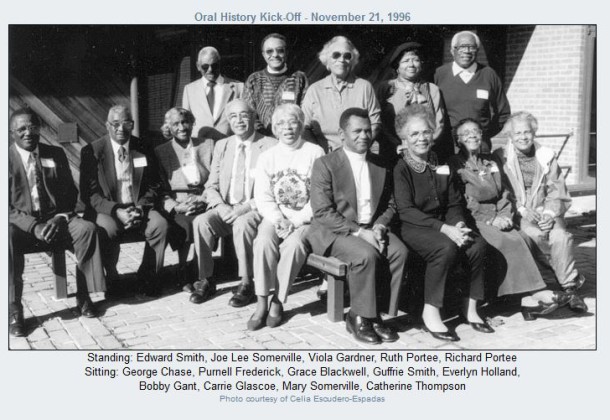Remembering When Pax Was Still Pearson

![]() The SlackWater Center at St. Mary’s College is a consortium of students, faculty, and community members documenting and interpreting the region’s changing landscapes. Oral histories are at the core of the Center, which also allows students to explore the region through historical documents, images, literature, and scientific and environmental evidence. Some of this work is published in the print journal SlackWater, some of which is online and some is published here.
The SlackWater Center at St. Mary’s College is a consortium of students, faculty, and community members documenting and interpreting the region’s changing landscapes. Oral histories are at the core of the Center, which also allows students to explore the region through historical documents, images, literature, and scientific and environmental evidence. Some of this work is published in the print journal SlackWater, some of which is online and some is published here.
The ‘Cedar Point 1942’ project documents stories of Cedar Point, Maryland from before and after World War II. The US Navy had purchased 6,412 acres at Cedar Point on the Patuxent River in 1942 to construct the Naval Air Station Patuxent River.
Although Ruth Elizabeth Barnes Portee was born and lived into her teens on the remote and rural Cedar Point, by her 1987 oral history interview the navy base had become so fixed in the local consciousness that she refers to her childhood home as “living on base.”
The upheaval of centuries of farming families was traumatic. But in the transcript of her full five-interview oral history, Mrs. Portee recalls not the upheaval of the transition, but the simple differences in life before and after “the base” and of things that didn’t change.
Below is a condensed and reformatted version of the oral history transcript by Mr. Painter. The full transcript is available here, as well as additional information on the original interview and opportunities to access the original audio interviews.
Mr. Painter interviewed Mrs. Portee at her home in Lexington Park, MD, only a few miles north of Cedar Point on the Maryland shore at the mouth of the Patuxent River. Before Pax River, two brothers named Barnes married two sisters and settled side by side on 14 acres in Piney Hill, “called so because we were on a small hill,” Mrs. Portee recounts. The Barnes received their mail at Pearson, about a five mile round trip.
Ruth Elizabeth Barnes grew up with her siblings and double-first cousins on a small farm with a garden and a wooded area for winter fuel. They toted water to the homes from a community spring “used by all of the people in that neighborhood. Had to go over someone else’s property to get to it.”
The Barnes children attended Jarboesville High School, “in a different direction [from Pearson] not a mile walk.”
“Come home, Mama would begin cooking. (Meat, squirrel, rabbit, a lot of meat in our diet, also chicken, turtle, ham. During Lent we ate fish, and on Fridays.) And Daddy would get the horse in, feed it hay, and feed the hogs, whatever scraps were left from the table, and then they had corn, because Mr. Anderson who lived across the road, he had a corn field.” Across the road was nearly a half-mile away.
Her father worked at Millstone Landing “until we moved out of the base. These boats would come in … I assume from Baltimore. This was Millstone Store, which was owned by Mr. Franklin Aud. He had all kind of things in this particular store that would come in on the boat.”
“We didn’t get electricity until we moved out of the base. We had lamps. I thought we were very fortunate, because Daddy could do many things, and Mama had learned the household, cooking and canning, we did all that during the summer in order to prepare for the winter. I think, we were poor but we were rich, because we had love in our family. We prayed together all the time.”
“They probably had been discussing or looking about taking pictures, maybe [19]39 or 40. My parents didn’t tell me too much about it because I didn’t figure in with the amount of money they got.
“‘A group of people will be coming to take over this place and we have to move out of the base’. And they were wondering where they could move. That’s all I heard them say at that time, and in ’42 we moved out. But they didn’t talk about it too much. I do remember hearing my father say, ‘Gosh, they gonna take this 14 acres here, and then they’re gonna take the other land that we have along the road, it’s going to go all the way. All of us, everybody here, Piney Hill, Fordtown, will have to move out and find places some other place.”
“When we moved off of the base, and the Blue Angels came, he never would go onto the base to see them. They would fly right over the house because we lived just outside of the base where the old railroad tracks were, when I saw the Blue Angels go over in formation that they had, I said, ‘Look Daddy, look at this.’ And he said, ‘Um, that looks all right but I don’t have time, I don’t want to listen to that, I don’t want to look at it.'”
SlackWater Center postings are sponsored by supporters: Lynn Erwin, Tri-County Abstract, Jack Russell, and Raleys Home Furnishings.

























“When we moved off of the base, and the Blue Angels came, he never would go onto the base to see them. They would fly right over the house because we lived just outside of the base where the old railroad tracks were, when I saw the Blue Angels go over in formation that they had, I said, ‘Look Daddy, look at this.’ And he said, ‘Um, that looks all right but I don’t have time, I don’t want to listen to that, I don’t want to look at it.’”
I think I would have felt the same way. Imagine having your home ripped away from you….